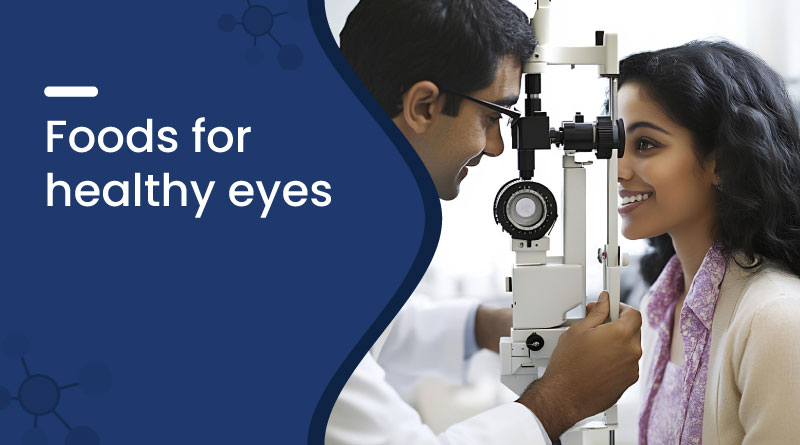Best Foods for Healthy Eyes – Improve Vision Naturally


Now, our eyes have to face much more stress than in earlier times. Many factors can affect our eye health, such as extended screen time, pollution, and aging. Maintaining good eye health is crucial for everyone. You can protect and improve your eyesight by simply including certain vitamins and nutrients in your diet. In this blog, we will explore the essential nutrients, the best foods for healthy eyes, and habits that should be avoided.
Key Nutrients for Eye Health
Healthy vision depends on the regular intake of vital nutrients that support eye function. Antioxidants such as lutein and zeaxanthin help protect the eyes by filtering out harmful light, while omega-3 fatty acids contribute to the overall health of the retina. Key vitamins like A, C, and E, along with the mineral zinc, are also vital; they help preserve sharp vision and protect the eyes from aging-related issues and vision decline.
Best Foods for Healthy Eyes
Foods rich in Vitamin A
Vitamin A is very important for maintaining the health of the cornea and is especially known for improving night vision. A deficiency of vitamin A in the body can lead to night blindness.
- Carrots
- Sweet potatoes
- Spinach
- Pumpkin
- Mango
Also read - Vitamin A for Eye Health
Foods rich in Vitamin C
Vitamin C strengthens the blood vessels in the eyes, supports collagen formation, and may slow the progression of cataracts.
- Oranges
- Strawberries
- Bell peppers
- Broccoli
- Kiwi
Foods rich in Vitamin E
Vitamin E acts as a powerful antioxidant that protects eye cells from oxidative stress and damage caused by free radicals.
- Almonds
- Sunflower seeds
- Avocados
- Hazelnut
- Spinach
Also read - How Vitamin E Helps Prevent Eye Disorders
Lutein and Zeaxanthin-rich foods
These carotenoids act as antioxidants and protect the central part of the retina from harmful blue light and free radicals.
- Kale
- Corn
- Egg yolks
- Zucchini
- Peas
Omega-3 Fatty Acids
Omega-3s are beneficial for the retina and help reduce symptoms of dry eyes, especially in people who are exposed to screens for long hours.
- Salmon
- Chia seeds
- Walnuts
- Flaxseeds
- Mackerel
Foods packed with Zinc
Zinc helps transport vitamin A from the liver to the retina and supports overall eye health.
- Chickpeas
- Pumpkin seeds
- Oysters
- Eggs
- Whole grains
Foods and Habits That May Harm Your Eyes
While the right diet can protect your eyes, certain foods and habits can increase the risk of eye damage over time. Try to avoid or limit:
- Deep-fried and processed foods
- Excess sugar and refined carbs
- High-sodium foods (which may increase eye pressure)
- Excessive alcohol intake
- Smoking (a major risk factor for cataracts and macular degeneration)
- Avoid frequent rubbing of the eyes
- Avoid sleeping with contact lenses
Lifestyle Tips for Long-Term Eye Health
A balanced lifestyle, coupled with the right foods, can go a long way in protecting your eyesight. You can follow these tips to support better eye health:
- Drinking enough water helps keep your eyes moist and reduces dryness.
- Get regular eye check-ups, even if you don’t wear glasses
- Wear sunglasses that block 100% of UV rays
- Reduce screen glare with filters or blue-light glasses
- Ensure 7–8 hours of quality sleep
Exercises to Relax and Strengthen the Eyes
Doing simple eye exercises every day can boost focus, ease eye strain, and improve blood flow to the eyes.
- Palming: Gently rub your hands together to generate warmth, then place them over your closed eyes to help them relax.
- Figure Eight: Move your eyes in the shape of the number 8 to improve eye muscle flexibility and coordination.
- 20-20-20 Rule: Prevent eye fatigue by following this rule—every 20 minutes, shift your gaze to something 20 feet away for 20 seconds.
- Blinking Exercise: Blink rapidly for a few seconds to moisten your eyes and reduce dryness.
If your eyes often feel dry or tired, lubricating eye drops can provide quick relief and help maintain comfort, especially during long hours of screen use.
Also read - Best Eye Drops For Daily Use
Conclusion
A healthy diet can go a long way in protecting your vision. Include leafy greens, fish, nuts, and colorful fruits to support eye health. Avoid harmful habits, stay hydrated, and do simple eye exercises. Don’t skip regular eye check-ups, and use doctor-recommended eye drops if needed. Small daily steps can lead to clearer, stronger vision over time.
Frequently Asked Questions (FAQs)
Q. Which is the most important nutrient for maintaining healthy eyes?
A. Vitamin A is considered a very important component in maintaining eye health and also prevents night blindness.
Q. Can diet help in improving vision?
A. A healthy diet can support eye health and prevent age-related conditions, but it cannot reverse the already existing vision problems.
Q. How is screen time harmful for the eyes?
A. Too much screen time can tire out your eyes and cause digital eye strain. To ease strain, you can use lubricating eye drops or practice some basic eye exercises.
Q. Which fruits should I eat to improve my eyesight?
A. Fruits that are high in vitamin C and antioxidants are the best ones for supporting eye health, for example, oranges, kiwis, mangoes, and blueberries.
Q. Can drinking water help eye health?
A. Yes, staying hydrated helps maintain moisture in the eyes, supports tear production, and reduces the risk of dryness.
Recent Blogs
Disclaimer : Zeelab Pharmacy provides health information for knowledge only. Do not self-medicate. Always consult a qualified doctor before starting, stopping, or changing any medicine or treatment.
















 Added!
Added!